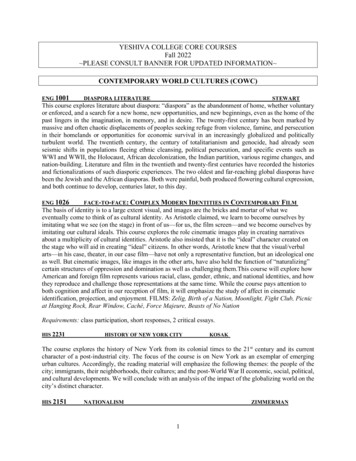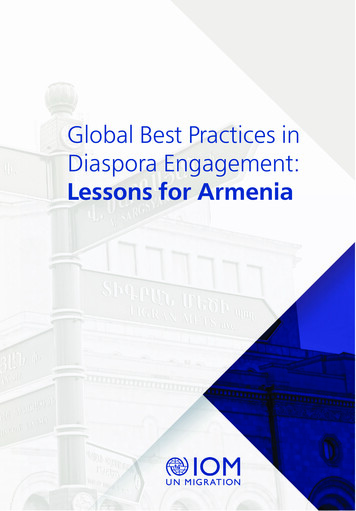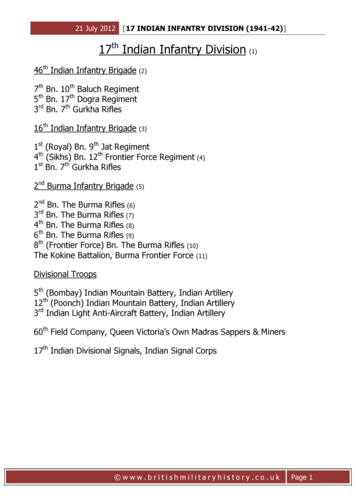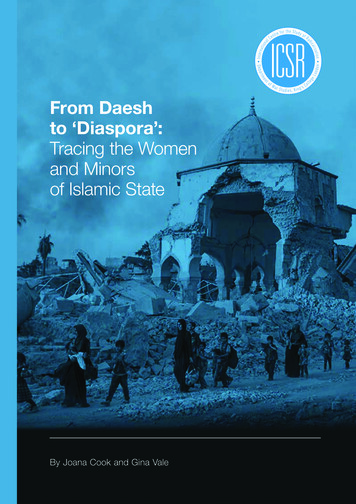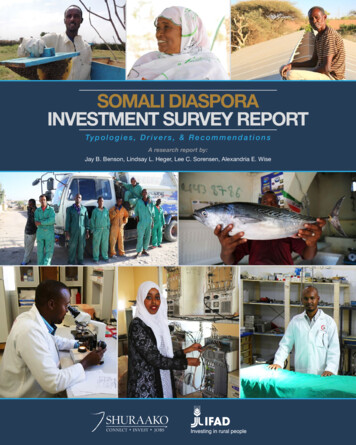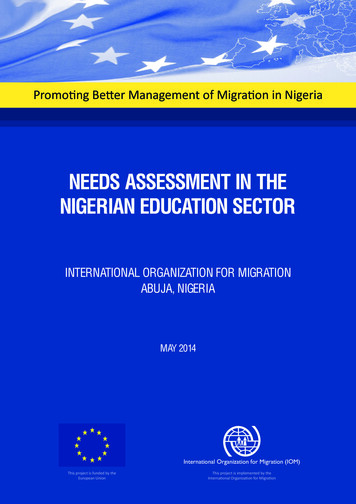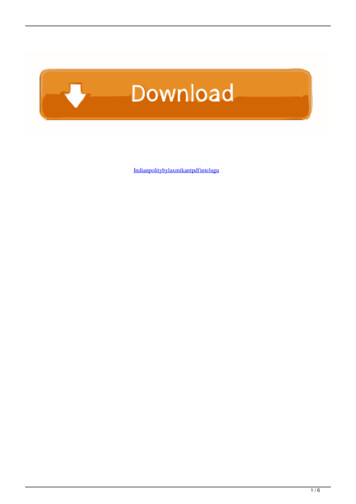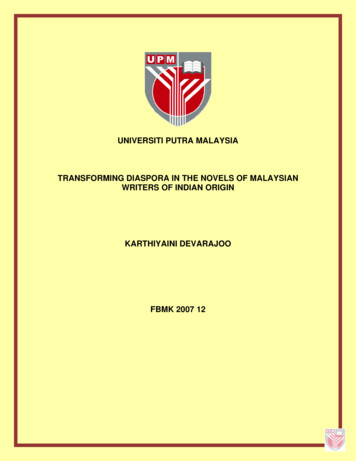
Transcription
UNIVERSITI PUTRA MALAYSIATRANSFORMING DIASPORA IN THE NOVELS OF MALAYSIANWRITERS OF INDIAN ORIGINKARTHIYAINI DEVARAJOOFBMK 2007 12
TRANSFORMING DIASPORA IN THE NOVELS OF MALAYSIANWRITERS OF INDIAN ORIGINByKARTHIYAINI DEVARAJOOThesis Submitted to the School of Graduate Studies, Universiti PutraMalaysia, in Fulfilment of the Requirement for the Degree ofDoctor of PhilosophyJuly 2007
DEDICATIONThis dissertation is a special dedication to all the children in the family.ii
Abstract of thesis presented to the Senate of Universiti Putra Malaysia infulfilment of the requirement for the degree of Doctor of PhilosophyTRANSFORMING DIASPORA IN THE NOVELS OF MALAYSIANWRITERS OF INDIAN ORIGINByKARTHIYAINI DEVARAJOOJuly 2007Chairman:Noritah Omar, PhDFaculty:Modern Languages and CommunicationMalaysian writers of Indian origin writing in English have carved a traditionof their own in the Malaysian literary realm. The Indian diaspora inMalaysian Literature in English plays a dual-role. One is the Indian writerwho is part of the diaspora himself and the other is the Indian charactersthat they portray in their writings. Both roles are equally significant in thecontribution towards the development of literature in English in Malaysiaand in its depiction of the social, political, economical, spiritual and culturallife of the Indian in Malaysia. The surge of writings in English by MalaysianIndians this millennium inevitably documents the Indian experience inMalaysia and establishes the evolving status of the Indian as a citizen ofiii
this land called home. Six novels by three Malaysian authors of Indianorigin are used as a basis for texts analysis in this study of which five werepublished in the 21st century. The point of departure for this study isK.S.Maniam’sarticle“TheDiaspora” 1Newwhich calls for the ‘internationalization’ of Malaysian literature inEnglish by writers of an up-coming community, The New Diaspora, forwider acceptance, greater recognition and broader and higherconsumption globally. The diaspora is seen as a temporary transitionalphase that is initially bound by ethnicity and eventually transforms andtranscends ethnic, racial, regional and national boundaries to becomeglobal citizens. Taking on a socio-political approach to literary study,this study explores novels in English by Malaysian writers of Indianorigin to locate the Indian diaspora, to identify the temporarytransitional phase of the diaspora and to trace the onalization’ofcommunalliteratures which consequently encourages and promotes globalconsumption.iv
5
Abstrak tesis yang dikemukakan kepada Senat Universiti Putra Malaysiasebagai memenuhi keperluan untuk ijazah Doktor FalsafahTRANSFORMASI DIASPORA DALAM NOVEL-NOVEL OLEHPENULIS-PENULIS MALAYSIA KETURUNAN INDIAOlehKARTHIYAINI DEVARAJOOJuly 2007Pengerusi: Noritah Omar, PhDFakulti: Bahasa Moden dan KomunikasiPenulis-penulis Malaysia keturunan India yang menulis dalam bahasaInggeris telah mencatat tradisi tersendiri dalam alam kesusasteraanMalaysia. Diaspora India dalam kesusasteraan Malaysia memainkan duaperanan iaitu satu sebagai penulis keturunan India dan lagi satu sebagaiwatak India dalam penulisan mereka. Kedua-dua peranan yang dimainkanini memberi signifikasi yang setara terhadap penyumbangan merekakearah pembangunan kesusasteraan dalam bahasa Inggeris di Malaysia.Ia juga memberi penggambaran kehidupan diaspora India dari segi sosial,politik, ekonomi, keagamaan dan kebudayaan di Malaysia. Terdapatpeningkatan penerbitan oleh penulis-penulis keturunan India yangmendokumentasikan pengalaman India di Malaysia dan seterusnyamenentukan status perubahan yang berterusan di kalangan orang-orangIndia sebagai warganegara Malaysia. Enam novel oleh tiga penulisv
Malaysia keturunan India di kaji untuk analysis tekstual dan lima dari novelini diterbitkan dalam abad ini. Detik permulaanK.S.Maniambertajuk“TheNewkajian ini adalah artikelDiaspora” iyangmendorong‘internationalization’ kesusateraan Malaysia dalam bahasa Inggeris olehpenulis-penulis komuniti baru yang di kenal sebagai ‘The New Diaspora’untuk penerimaan yang meluas, pengenalan dan penggunaan yangmeningkat dan bersebar di seluruh dunia. Diaspora dianggap sebagaisatu fasa yang tidak kekal dan berubah-ubah dan ia di bendung padamulanya oleh ethnisiti, kemudian ia berubah dan menjejak batasan ethnik,bangsa, kawasan dan negara untuk menjadi warganegara Malaysia danseterusnya warga dunia. Dengan menggunakan kaedah sosio-politik,kajian ini meneliti novel-novel dalam bahasa Inggeris oleh andiasporaIndia,mengenalpasti fasa diaspora yang tidak kekal dan berubah-ubah danmenjejak transformasi yang menyumbang terhadap gseterusnyadapatmemupukmempromosikan novel-novel Malaysia pada peringkat antarabangsa.vidan
vii
ACKNOWLEDGEMENTSThis dissertation would not be if not for the love and patience of myhusband Ashok and children Rabyin and Jannusha. My husband was thepillar of strength that kept the family going while I was coping with variouscommitments at work, at the university and at home. I will always beindebted to him for the freedom I enjoyed as a part-time student. Myparents and siblings constantly directed gentle words of encouragementthat flickered like a flame in the depth of my soul.The supportive evaluation and precious time shared during the course ofthis study with my Supervisory committee: Chairperson Dr Noritah Omarand members Dr Washima Che Dan and Dr Wan Roselezam Wan Yahya;provided valuable insights into my own writing. Dr Noritah’s sharpobservations complemented Dr Washima’s thought-provoking questionsand Dr Wan’s gentle words of caution to avoid pitfalls and suggestions toenhance my arguments, guided me through the evolving stages of writingup this dissertation.Careful reading with comments and suggestions on the first three chaptersby Jean Floyd, ELT Resource Consultant, English Language TeachingCentre Malaysia, led to interesting discussions that greatly contributed tothe entire writing up of this dissertation.vii
My good friend Anne Freeman was always there for me during tryingtimes and moments of despair. I thank her for all the drinks we have hadtogether in the process of motivating me to stay on track. My colleagueKamariah Samsuddin is another friend who was ready to pull me out ofthe doldrums, especially during the last two years of my study. The adviceand words of comfort and encouragement from all my colleagues atEnglish Language Teaching Centre Malaysia, in one way or another,contributed to the successful completion of this dissertation.Puan Salmiha Amin of the Faculty of Modern Languages andCommunication, University Putra Malaysia was a great support when itcame to fulfilling the technical requirements for procedures each semesterand in finally submitting this thesis.To all the others whose names are not mentioned above, I truly appreciateyour contribution in guiding and encouraging me throughout the course ofthis doctoral research.viii
I certify that an Examination Committee has met on 6th July 2007 toconduct the final examination of Karthiyaini Devarajoo on her Degree ofDoctor of Philosophy thesis entitled “Transforming Diaspora in the Novelsof Malaysian Writers of Indian Origin” in accordance with UniversitiPertanian Malaysia (Higher Degree) Act 1980 and Universiti PertanianMalaysia (Higher Degree) Regulations 1981. The Committee recommendsthat the candidate be awarded the relevant degree.Members of the Examination Committee are as follows:Wong Bee Eng, PhDAssociate ProfessorFaculty of Modern Languages and CommunicationUniversiti Putra Malaysia(Chairman)Malachi Edwin Vethamani, PhDAssociate ProfessorFaculty of Educational StudiesUniversiti Putra Malaysia(Internal Examiner)Mohd. Zariat Abd. Rani, PhDLecturerFaculty of Modern Languages and CommunicationUniversiti Putra Malaysia(Internal Examiner)John Mclaren , PhDEmeritus ProfessorSchool of Communication Culture & LanguagesVictoria University, Melbourne, Australia(External Examiner)HASANAH MOHD. GHAZALI, PhDProfessor and Deputy DeanSchool of Graduate StudiesUniversiti Putra MalaysiaDate: 24 October 2007ix
This thesis submitted to the Senate of Universiti Putra Malaysia and hasbeen accepted as fulfillment of the requirement for the degree of Doctor ofPhilosophy. The members of the Supervisory Committee are as follows:Noritah Omar, PhDLecturerFaculty of Modern Languages and CommunicationUniversiti Putra Malaysia(Chairman)Washima Che Dan, PhDLecturerFaculty of Modern Languages and CommunicationUniversiti Putra Malaysia(Member)Wan Roselezam Wan Yahya, PhDLecturerFaculty of Modern Languages and CommunicationUniversiti Putra Malaysia(Member)AINI IDERIS, PhDProfessor and DeanSchool of Graduate StudiesUniversiti Putra MalaysiaDate: 15 November 2007x
DECLARATIONI hereby declare that the thesis is based on my original work except forquotations and citations which have been duly acknowledged. I alsodeclare that it has not been previously or concurrently submitted for anyother degree at UPM or other institutions.KARTHIYAINI DEVARAJOODate: 17 December 2007xi
TABLE OF LE OF CONTENTSLIST OF TABLESLIST OF FIGURESLIST OF und of StudyProblem StatementScope of StudyConceptual FrameworkObjectives of StudySignificance of StudyLimitations of StudyMethodologyOrganisation of thesisConclusion11161920212329303133NEGOTIATING ALIEN TERRAINS INCONTACT ZONESPreambleDefining and delimiting diasporaDiaspora and identityConceptualising diasporaDiaspora formationThe politics of ethnic diasporasSocial and political aspects of diasporaDiasporic characteristicsTracing Indian diasporaIndians in MalaysiaConclusion3434444750555960717888xii
IIIlVVVILOCATING ETHNICITY: LANGUAGE, RELIGIONAND CULTUREPreambleStudy of diaspora within post-colonialismLiterature of the diasporaLanguage choice and the politicsof languageMalaysian literature in EnglishMalaysia as a multicultural andmultiracial nationThe Indian cultural heritageConclusion135139144SUSTAINING CULTURAL HERITAGE TORECONSTRUCT EXPERIENCE AND MEMORYPreambleTracing the diaspora in the textsThe personal experience of a dispersionCollective memorySustaining a cultural heritageConclusion146147149155161170ALIENATION AND IDEAL HOMLANDSIN CONTACT ZONESPreambleA sense of alienationAncestral homeland is the ideal homeCommitted to safety and prosperityof homelandConclusionNETWORKING FOR SOLIDARITY ANDA VIRTUAL HOMEPreambleSolidarity through group identityCreate an imagined homelandSurvive as a diaspora for 91191196200205
VllVIIlLOCAL AND GLOBAL RECOGNITIONWorld Literature in EnglishLiterature in English by the Indiandiaspora in DATA OF THE AUTHOR254267292xiv
LIST OF TABLESTablePage1Major Indian Populations Outside IndianCommunity (1985-2000)2The authors, their novels and the yearof publicationxv25205
LIST OF FIGURESFigure1PageEvolving themes and issues in novelsby Malaysian writers of Indian originxvi242
LIST OF ABBREVIATIONSGOPIO-Global Organisation of People of Indian OriginCSID-Centre for the Study of Indian DiasporaNGO-Non-Governmental OrganisationPIO-People of Indian OriginNRI-Non-Resident IndianPRI-Permanent Resident IndianISSCO-International Society for the Study of ChineseOverseasFMS-Federated Malayan StatesINA-Indian National ArmyUNESCO-United Nation Education, Social and CulturalOrganisationICA-Intangible Cultural Heritagexvii
CHAPTER IINTRODUCTIONPreambleAs a Malaysian of Indian origin, a member of the Indian diaspora, Iregularly confront the complexities of having multiple identities andloyalties. The geographic displacement of my ancestors has destabilisedthe construction of an identity to call my own. In this study I explore thesocial and political implications of being part of a diasporic community asreflected in literary works by Malaysian writers of Indian origin.Background of StudyAccording to Bhabha in Location of Culture , the characteristics of aparticular diaspora can change over time; they are temporal, transitionaland translational (1994:224). Such transformation is evident in Malaysianwriters of Indian origin where they display three phases in their writing:diaspora; citizen of the nation; citizen of the world. Judith T. Shuval(2000),Rose Professor of Sociology, Hebrew University of Jerusalemclaims that such transformations are “in response to processes in thethree relevant referents: the group itself, the host society and thehomeland”. It is my contention that the three phases of transformation:diasporic; citizen of the nation; citizen of the world and then writing about
other minority communities in the world; has positively influenced“internationalisation”, which means gaining international recognition, ofcontemporary Malaysian novels in English by Malaysian writers of Indianorigin.This study first examines the characteristics commonly associated withdiasporic communities around the world. It then explores contemporarynovels in English to locate notions of a diaspora in their texts and to tracechanges in the writers, their writing and their community in response totheir new environment; an example of such a change is the integration ofthe writers’ cultures with the cultures in the hostland.The phrase “writers of Indian origin” has been extensively used in variousstudies on Indian diasporic writers globally, particularly in the UnitedKingdom, the United States and Europe. However, in discussing the needfor an appropriate term, the Malaysian Indian Writers Foundation reportsin “Speaking in Tongues: The Kavyan Writers” that “[b]y the late 1990s, ahandful of these new writers [referring to Malaysian Indian writers] hadcome to realise that something had to be done to identify themselves inthe Malaysian literary scene as ‘Malaysian Indian writers’ and ‘Malaysianwriters’ - not merely ‘Non-Malay writers’”. The ensuing soul-searching ledto the formation of Yayasan Sasterawan Kaum India Malaysia (Malaysian2
Indian Writers Foundation), better known as Kavyan, and the production of"Sastera Kavyan" (Kavyan Writings)”.The changes in a diasporic society are studied in various fields likesociology, anthropology, political science and literature. In carrying outsuch studies, one of the common strategies used by diasporists is throughthe tabulation of a set of characteristics of the diasporic community.Sudesh Mishra writes:[a] common strategy among diasporists is to classifydiasporic social formations by (1) identifying new structuresof being (identity) of an uprooted ethnic collectivity as itoscillates between homeland (2) by the absent topos andhostland (the present topos), by tabulating a set of definingcharacteristics of this collectivity and (3) by alluding to somekind of departure manifested on the plane of consciousness,as reified in memory” (16)Mishra further asserts that diasporists tend to draw on ‘culturalproductions’ such as art, dance and literature, that are aesthetic andproduced by such communities to back up their assertions (Mishra 16).Literary works as ‘cultural productions’ inform the readers of various‘social formations’ or communities. Mishra’s observation supports the useof literary works as the basis for this study on diaspora, which endeavoursto explore the disposition of the Indian community based on the literaryworks it produces.3
The novels selected for this study, which are produced in the contactzone, as the result of the encounter between the diaspora and thehostland, are analysed to explore the authors’ views, as members of theIndian diaspora, on the changes in the Indian community in Malaysia.According to Sigmund Freud, “an author’s chief motivation for writing anystory is to gratify some secret desire, some forbidden wish that probablydeveloped during the author’s infancy and was immediately suppressedand dumped in the unconscious (Bressler 94). Thus an attempt is made inthis study to explicate the authors’ views through the characters portrayedin their literary works to trace notions of a diaspora.The point of departure for this study is K.S.Maniam’s article “The NewDiaspora” 1 which was presented at a conference in Australia in 1996. Heexplores the problems of ‘internationalising’ community literatures, that ismaking available community literatures in a “physical and touristy way”,using the multicultural situation in Malaysia as a sort of model to reflect anational identity.The term “internationalizing” is capable of severalinterpretations; Maniam means making the literature produced byMalaysian writers appeal to international audience.Maniam is a Malaysian who pioneered writing in English and a literarycritic of notable standing and recognition in the region. Referring to his4
own writings Maniam asserts that he is “pushing the frontiers of consciousness away from a purely social, political and cultural centre to heal thefragmented self of man to see man whole .” (1996:x). As a Malaysianwriter of Indian origin, Maniam negotiates the creation of a national identitywhile retaining his ethnic soul. In the above article he calls for the‘internationalisation’ of Malaysian literatures in English by writers of a newcommunity, the New Diaspora whose writing reflect a multicultural andmultiracial Malaysian identity. Maniam’s view on Malaysians writing inEnglish will be further discussed in Chapter Two and Three.Maniam calls for a multicultural depiction because he sees the quest forcultural and racial purity as a “deadly risk” where he states that[p]ut within this larger framework, a country that supportscultural purity and loyalty, directly or indirectly, may invitecertain risks. One deadly risk, as I see it, is the isolation thata celebratory sense can bring to that culture and society.And this isolation, in turn, causes a closing off of its bordersof awareness.The possible risk is that the increased awareness and promotion of thewriters’ ethnic origin and the presence of notions of a diaspora in theirliterary works might complicate the vision for the creation of a nationalidentity in Malaysian literature.5
this study explores novels in English by Malaysian writers of Indian origin to locate the Indian diaspora, to identify the temporary transitional phase of the diaspora and to trace the transcendent transformation that supports 'internationalization' of communal literatures which consequently encourages and promotes global consumption. 5. Abstrak tesis yang dikemukakan kepada Senat .


